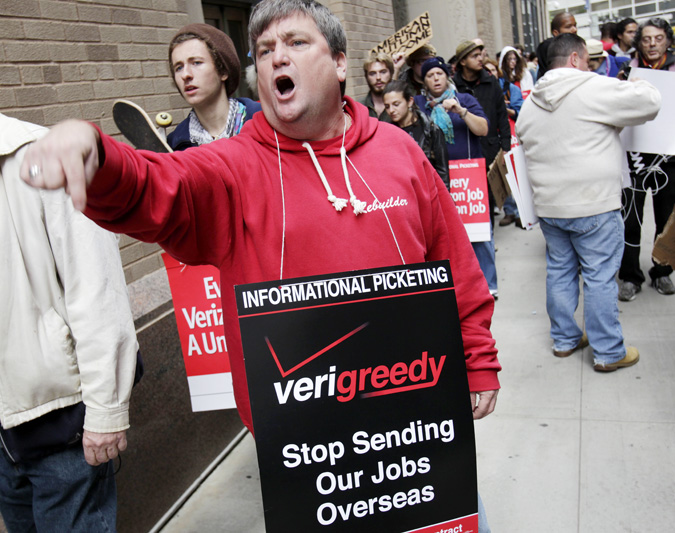NEW YORK — A diverse group of powerful unions joined demonstrations near Wall Street on today, lending some focus, credibility and potentially hundreds of participants to a group that started out with a few camped-out college students.
Among those planning to join the clamor were members of the Chinatown Tenants Union and the Transit Workers Union, the liberal group MoveOn.org, and community organizations like the Working Families Party and United NY. Organizers have called for students at college campuses across the nation to walk out of class in protest.
“We’re really excited that labor is part of the protest,” said Sara Niccoli, spokeswoman for the Labor-Religion Coalition, an Albany, N.Y.-based organization that aims to “do justice” for workers.
Today, the groups will embark on a march starting at Foley Square in lower Manhattan, an area encircled by courthouses and named for “Big Tom” Foley, a former blacksmith’s helper who became a prominent New York Democratic Party leader.
The marchers will head to Zuccotti Park, the unofficial headquarters where protesters have been camped out in sleeping bags. It’s unclear how many people will be joining the march today, but some organizers said thousands could show up.
The Occupy Wall Street protests started on Sept. 17 with a few dozen demonstrators who tried to pitch tents in front of the New York Stock Exchange. Since then, hundreds have set up camp in a park nearby and have become increasingly organized, lining up medical aid and legal help and printing their own newspaper, the Occupied Wall Street Journal. Other groups have periodically gathered and protested in spots throughout the country.
Police said that United NY had sought a permit for the rally today and were expecting about 2,000. They were planning to use microphones at the square, but not at the park.
“I think they’re capturing a feel of disempowerment, feeling like nobody is listening to them,” said Camille Rivera, executive director of United NY. “What do you do when no one is listening to you? You speak up, you take action.”
No one needs a permit to protest. Picket lines and marches go on nearly every day in New York. But a permit allows demonstrators to do things that would normally be illegal — like filling an entire street. During the U.N. General Assembly, thousands of protesters took to the streets, but police were aware and facilitated and planned for traffic disruptions.
But, for example, during one day of the assembly, six demonstrators attempted to block traffic and were arrested.
“That was more in the tradition of civil disobedience,” said Paul Browne, spokesman for the NYPD. “It seemed their aim was to get arrested.”
About 700 members of the Wall Street group were arrested and given disorderly conduct summonses for spilling into the roadway of the Brooklyn Bridge on Saturday despite warnings from police.
It’s not clear whether the protesters meant it as civil disobedience; some say they were tricked by police into entering the road and were wrongly arrested. Police video shows officers with bullhorns telling them to keep off the road.
Browne said that the department is prepared for a large group march today, and that officers were anticipating spillover onto the streets.
“Officers will be in the lane next to the sidewalk, and we will try to keep people on the sidewalk, but we realize they may need to walk on the street if it’s crowded,” he said.
The type of activity that could result in arrest would be if members of the group, say, purposefully try to stop traffic on Broadway, Browne said.
MoveOn.org is planning a “virtual march” on its website by encouraging people to post photos of themselves with the caption: “I’m the 99 percent” — a reference to those people not among the wealthiest 1 percent of Americans and the debate over whether they should be taxed more. The group’s executive director, Justin Ruben, called the protesters “brave young people” who have successfully inspired others to join them.
“From our perspective, we’re protesting kind of the greed that led to the collapse of our economy,” Ruben said. “The fact that these banks aren’t paying their fair share.”
Send questions/comments to the editors.


